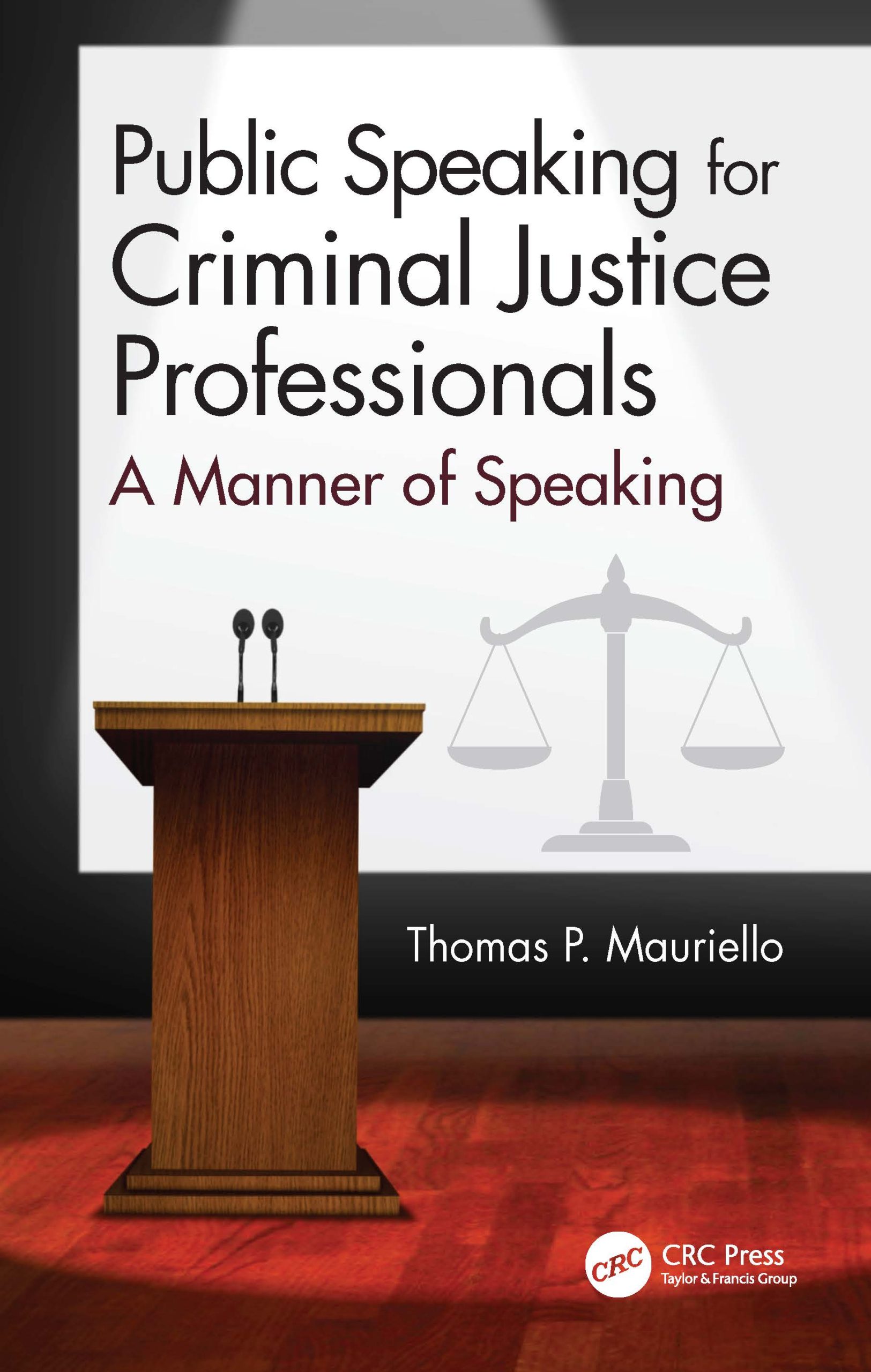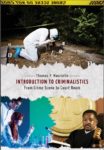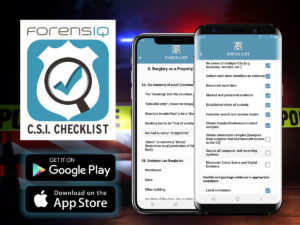New Digital Criminalistics Textbook
Great River Learning announces the publication of their all new digital textbook, authored by University of Maryland professor, Thomas P. Mauriello. This first of a kind etextbook integrates all the content, video lectures, interactive exercises, testing, and evaluation activities needed to present curriculum in a manner best received by today’s students. It is combined with practical exercises associated with the CCJS Crime Laboratory and Mock Crime Scene facility. It is being used for the first time this semester in Professor Mauriello’s classes and will be marketed nationally in the spring.
ForensicWeek.com Show airing Episode 63 – “Forensic Lexicology”
The ForensicWeek.com Webcast TV Show is airing Episode 63 this Thursday, September 18th at 7:00 P.M. (EST). The topic this week is “Forensic Lexicology¾Analyzing the Written Word.” Lexicology is the part of linguistics which studies words, their nature and meaning, the relationship between words, word groups and the whole lexicon. It is an investigative tool used by forensic accountants when examining data with perhaps the two most prevalent forms of questioned document evidence being “numbers” and “words.”
Forensic Accountant and author, Darrell Dorrell returns as a special guest on the ForensicWeek.com Show to discuss this valuable tool and demonstrate its use in during an investigation. So join host, Tom Mauriello and his student interns on www.ForensicWeek.com, brought to you by ForensIQ, Inc.
Thank you for watching!
Indiana Proposal Would Require All Arrestees to Provide DNA Samples
Indiana lawmakers are making an effort to try and pass legislation that would require all arrestees of criminal offenses to provide a DNA sample. A study by Indiana University – Purdue University concluded that DNA collection from all arrested individuals would save Indiana taxpayers approximately $60 million annually.
Requiring all arrested individuals to provide their DNA would expand the database of the Indiana State Police crime lab, helping convict repeat criminal offenders and save in officer response times, and investigations, prosecutions, and court time. The lab collects 18,000 new samples per year and contains more than a quarter of a million DNA samples, which over the past 17 years, has helped law enforcement link nearly 4,200 suspects to crime scenes.
Senator Jim Merritt, states that having all arrestees provide DNA samples for criminal offense can serve as a quality tool, expand the state’s database, and can ultimately play a large role in law enforcement.
Click here to read the full article!
Source: The Indy Channel
[Abstract written by Noel Andres, ForensIQ Intern, 5/1/2014]
Prosecution from Gun Buyback
There has been concern around endangering the anonymity factor in the gun buyback program. After Boston’s buyback multiple investigations are underway by police after guns turned in were suspected of being used in possible crimes. The spokesman for the Boston Police Department has stated “The success of the gun buyback isn’t measured in the number of arrests made or cases successfully prosecuted. It’s about getting guns off the streets and making our community safer.” More than 270 guns have been turned in to police. The mayors office stated participants giving guns will not be prosecuted for unlawful possession but their guns will be tested to determine if they were used in crimes. This could cause potential problems for some and deter others from wanting to participate.
Click here for full article
Click here to see below blog item where ForensIQ’s, Tom Mauriello comments on an ABC TV News story discussing this same issue.
Source: Boston Herald
[Abstract written by Alicia Terrell, ForensIQ Intern, 050114]
Bruising Sensor to Determine Child Abuse
A University of Louisville research team has developed a force sensing skin that can be adapted to a child surrogate to identify potential bruising locations during mock laboratory experiments of accidents and abusive events. The presence, distribution and location of bruising on a child’s body can give a roadmap to documenting a child’s exposure to impact. It’s designed to contour to all body regions of the child surrogate to provide this roadmap. This mapping could also show the magnitude of force of each impact. This type of information could be critical in a forensic analysis of a child’s injury. Child surrogates have been used to study motor vehicle crashes to predict injury risk. But these studies have not focused on potential injuries to the skin or soft tissue. The researchers at Louisville want to develop a base of these roadmaps to be associated with various simulated events and compare this to clinical studies.
Source: Science Daily
Click here for full article
[Abstract written by Alicia Terrell, ForensIQ Intern, 041714]
3D Scanning for Illinois State Police
Illinois State Police will start using a 3-D scanner that will allow better record data from crime scenes. This technology will allow juries to virtually be at the scene of a crime. It will allow investigators to be able to reconstruct and preserve evidence easier. The scanner, Leica C10, is on a tripod and uses lasers to capture a room by creating a 3-D image. Once captured these images are uploaded to software to create a 360-degree virtual tour of a crime scene. The scanner was used at a recent shooting and took about four hours to scan images from inside and outside of a crime scene. Though this takes more time the Illinois State Police think it will be worth it. This will greatly improve presentation in the court room.
Source: BND
Click here for full article
[Abstract written by Alicia Terrell, ForensIQ Intern, 041714]
Talk Forensics – Digital Evidence Series
Talk Forensics is a new digital evidence series show that is brought to viewers by DFI News Digital Forensic Investigator© and Forensic Magazine.
The topic for discussion for their debut show is “Warrants.” Join Patrice Galvin, Editorial Director of DFI News and Forensic Magazine, in Episode 1, as the show examines how warrants apply to cell phones, computers, and other types of digital evidence.
Additional topics for discussion will include the Plain View Exception Controversy, Properly Preparing a Search Warrant, and Seeking Proper Legal Authority for Warrants. Talk Forensics seeks to engage and inform viewers about topics specifically related to the field of forensics. For more information about the series or to view the series click on the link below.
Click here for the link to the Talk Forensics digital evidence series!
Source: Forensic Magazine
[Abstract written by Noel Andres, ForensIQ Intern, 4/24/14]
Innocence Project of Texas Working to Prove Innocence of Inmates
The Innocence Project of Texas is a non-profit organization in Lubbock, Texas that offers legal aid to inmates who claim to have been falsely convicted. This organization is affiliated with the law school at Texas Tech University and is comprised of law students, three lawyers, an advisory board, and an office off-campus, who all manage 10,000 files from state prisoners.
Each file contains a letter from an inmate proclaiming innocence and asking for help in proving such in courts. Law students conduct a “needle in a haystack” method, send questionnaires to inmates, and start an investigation on cases where there is some doubt in the inmate’s guilt. The project can have anywhere from 30 to 50 investigations underway at any time; however, many investigations go nowhere, as students soon discover that an inmate might be withholding important facts or that vital evidence has been lost.
The Innocence Project of Texas and other numerous organizations, which are working to prove the innocence of inmates, can be found at multiple public law schools throughout the country.
Interested in reading more? Click here to view the full article!
Source: New York Times
[Abstract written by Noel Andres, ForensIQ Intern, 4/24/14]
Body Farm
Fox Valley Technical College in Wisconsin will be creating a body farm for research and training. A body farm is an outdoor research facility where forensic scientists have animal carcasses and human cadavers in different settings where they can study decomposition. This farm will help in determining time and circumstances of death that can be used in investigation. There are body farms in Colorado, North Carolina, Pennsylvania, Tennessee and Texas. What is unique about this body farm is that researchers will be able to study decomposition in extreme cold. For those who are thinking about donating their bodies to science here’s a way to make a difference in the forensic community.
Click here for full article
Source: USA Today
[Abstract written by Alicia Terrell, ForensIQ Intern, 040314]
400,000 Rape Kit Backlog
The Department of Justice says there are around 400,000 rape kits that are being untested around the country. In 2001 after New York City processed its 17,000 backlog their arrest rate for rape cases increased from 40 to 70 percent. Also in Detroit they analyzed the first 10 percent of their 11,000 backlog which led them to 46 serial rapists. Local authorities cannot afford to process all their kits containing DNA that could lead to convictions. Testing a rape kit could cost anywhere from $500 to $1,500. The White House announced an initiative to devote 35 million of the 2015 budget to processing unopened kits. Reopening of these kits could make a difference since rapists have one of the highest recidivism rates. These women go through exams that can take up to four hours and some will never hear anything about it because it can’t be processed.
Click here for full article
Source: New Republic
[Abstract written by Alicia Terrell, ForensIQ Intern, 031314]
Intelligent Fingerprinting for Drug Screening
A British company, Intelligent Fingerprinting, is developing the first handheld fingerprint-based drug screening device. This device is a non-invasive technology that can screen for multiple drugs and gives results in less than ten minutes. They have gotten funding from private US-based investors on top of government funded grants that will support their final stages of providing this product commercially. This could end the hassle of specialist collection arrangements and biohazard disposal facilities. The device is expected to go into pilot production in 2014.
With Colorado and Washington having legalized recreational marijuana there is the question of road side testing for impaired driving. Maybe this type of technology could shed light on the issue.
Click here for full article
Source: Forensic Magazine
[Abstract written by Alicia Terrell, ForensIQ Intern, 030514]
Forensic Psychologists Can Provide Supporting Evidence In Court
Forensic psychologists, particularly in the city of Chicago, may be summoned to court to provide clinical assessments and other supporting evidence that can essentially resolve disputes and accelerate decision-making in complex family cases. Forensic psychology combines the disciplines of forensics and psychology to provide both objective and independent assessments to questions and issues concerning law and the legal system. With this in mind, forensic psychologists can assist families in court by providing assistance with child custody, assessments of addictive disorders, psychotherapy and rehabilitation, and forensic psychology and financial distress.
Interested in reading more about forensic psychologists? Click here for the full article!
Source: Forensic Nexus
[Abstract written by Noel Andres, ForensIQ Intern 3/6/14]
Study Shows How Dogs are Trained to Detect Explosives
Training a dog is no easy feat. Training a dog to detect explosives is considerably much more difficult. This article overviews a study conducted by Indiana University-Perdue University Indianapolis that explored the method used to train police dogs and determine its effectiveness. With the results of the study, options can be discussed on what can be done to make canine detection legally admissible evidence in court.
Click here to view the article.
[Abstract by Walter Tates, ForensIQ Intern. 030614]
Legal Professionals – Spend Two Days Learning the Essentials of Forensic Science
WVU Forensic Science Initiative, in collaboration with the National Institute of Justice, will host a free two-day program entitled, Essentials of Forensic Science for Legal Professionals, for legal professionals to expand their understanding of forensic science topics. The program will be held March 11 – 12, 2014, on the West Virginia University Campus in Morgantown, WV. Interpretation of physical evidence, wrongful arson conviction, bias in forensic science evidence, and basic statistical concepts in forensics are a few of the topics that will be discussed. Members of the academic community, lab personnel, and legal specialists will instruct and apply real-world examples to the content presented in this two-day program.
Register now to attend the free Essentials of Forensic Science for Legal Professionals Program. The first 20 individuals to register will receive a free hotel stay while attending the two-day training program! Registration closes March 3, 2014, 5:00 p.m. ET.
For more information about the program and to register now click here!
Source: West Virginia University
[Abstract written by Noel Andres, ForensIQ Intern 2/27/14]
Smart Gun
With the height of gun control debate there is a new technology that can possibly bring some ease. A large firearm store in California has added to its inventory a smart gun called the Armatix iP1. What is so unique about this firearm is the accessory that is required with its purchase. For this smart gun to fire a watch has to be worn. There are electronic chips in the watch and the gun that communicate with each other. If the watch is close enough to the gun a green light turns on and it is able to be fired. This could change the future of gun making technology.
Click here for full article
Source: Washington Post
[Abstract written by Alicia Terrell, ForensIQ Intern, 022714]






